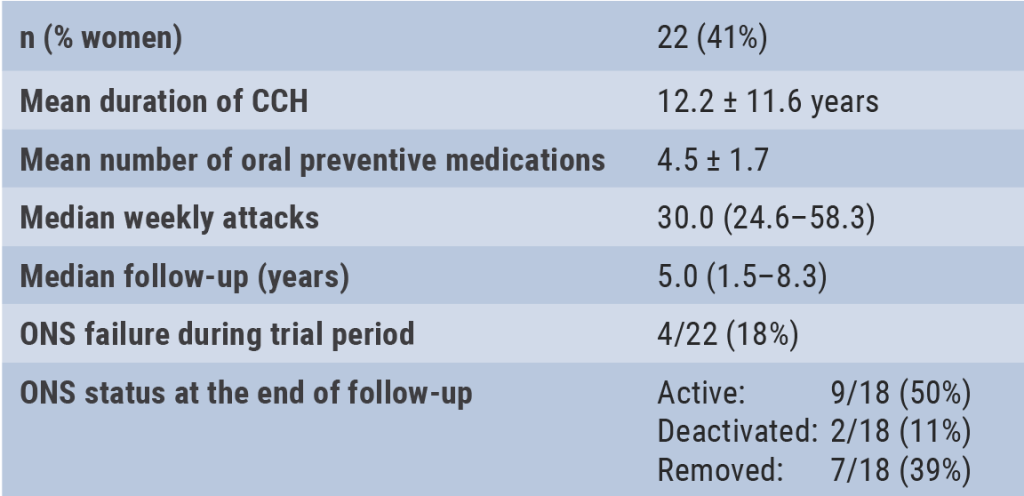Safinamide is a new monoamine oxidase (MAO) B inhibitor which also exerts a non-dopaminergic effect. The SAFINONMOTOR trial is a prospective, open-label, single-arm study to assess the effectiveness of safinamide on non-motor symptoms in PD patients [1]. The study's primary endpoint is change from baseline (V1) after 6 months (V4) in the Non-Motor Symptoms Scale (NMSS) total score. A total of 50 PD patients were included. Median age was 68.5; 58% were women; they had been diagnosed a mean of 6.4 years before. A total of 44 (88%) completed the follow-up observational period of 6 months.
The NMSS total score was reduced by 38.5% (P<0.0001) after 6 months: at baseline, it was 97.5; after 1 month, 65.9; after 3 months, 59.4; and after 6 months, 59.9. Improvement was observed in the following domains: sleep/fatigue (-35.8%; P=0.002), mood/apathy (-57.9%; P<0.0001), attention/memory (-23.9%; P=0.026), gastrointestinal symptoms (-33%; P=0.010), urinary symptoms (-28.3%; P=0.003), and pain/miscellaneous (-43%; P<0.0001). QoL, as measured by the 39-item Parkinson's Disease Questionnaire summary index (PDQ-39SI) improved by 29.4%: from 30.1 at baseline to 21.2 at 6 months (P<0.0001).
Eleven patients (22%) reported a total of 21 adverse events (AEs). Five AEs were severe, but none were deemed treatment related. The most frequent were dyskinesias and nausea (6%).
- Santos Garcia D, et al. Safinamide Improves Non-Motor Symptoms Burden in Parkinson´s Disease: An Open-label Prospective Study. OPR-108, EAN 2021 Virtual Congress, 19–22 June.
Copyright ©2021 Medicom Medical Publishers
Posted on
Previous Article
« Exploring the possibilities Next Article
Levodopa-carbidopa intestinal gel in patients with advanced PD »
« Exploring the possibilities Next Article
Levodopa-carbidopa intestinal gel in patients with advanced PD »
Table of Contents: EAN 2021
Featured articles
Letter from the Editor
COVID-19
First evidence of brainstem involvement in COVID-19
Cognitive/behavioural alterations persistent after COVID-19
Neural base of persistent hyposmia after COVID-19
Neurological symptoms and complications of COVID-19 affect outcomes
Cerebrovascular Disease
Intracerebral haemorrhage only slightly increases mortality in COVID-19 patients
Stroke with covert brain infarction indicates high vascular risk
Expanding precision medicine to stroke care
Dexamethasone not indicated for chronic subdural haematoma
Cognitive Impairment and Dementia
Severe outcomes of COVID-19 in patients with dementia
Promising diagnostic accuracy of plasma GFAP
Sex modulates effect of cognitive reserve on subjective cognitive decline
Hypersensitivity to uncertainty in subjective cognitive decline
Epilepsy
Minimally invasive device to detect focal seizure activity
‘Mozart effect’ in epilepsy: why Mozart tops Haydn
Migraine and Headache
Factors associated with decreased migraine attack risk
Pregnant migraine patients at higher risk of complications
Occipital nerve stimulation in drug-resistant cluster headache
Rhythmicity in primary headache disorders
Multiple Sclerosis and NMOSD
Typing behaviour to remotely monitor clinical MS status
Alemtuzumab in treatment-naïve patients with aggressive MS
No higher early MS relapse frequency after stopping ponesimod
Good long-term safety and efficacy of inebilizumab in NMOSD
Neuromuscular Disorders
Inability to recognise disgust as first cognitive symptom of ALS
Pathogenic T-cell signature identified in myasthenia gravis
Parkinson’s Disease
Levodopa-carbidopa intestinal gel in patients with advanced PD
New Frontier – Navigated Transcranial Ultrasound
Exploring the possibilities
Related Articles

August 18, 2021
Occipital nerve stimulation in drug-resistant cluster headache
August 18, 2021
Hypertension pathology visible in white matter lesion volume
August 18, 2021
Effect of prasinezumab on motor features in early PD
© 2024 Medicom Medical Publishers. All rights reserved. Terms and Conditions | Privacy Policy
HEAD OFFICE
Laarderhoogtweg 25
1101 EB Amsterdam
The Netherlands
T: +31 85 4012 560
E: publishers@medicom-publishers.com

